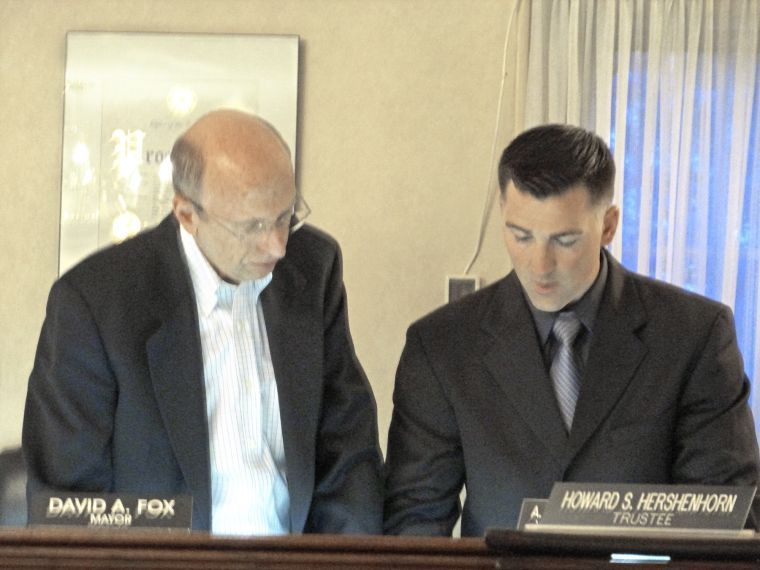
The Great Neck Estates board of trustees swore in two police officers at Monday night’s meeting as officer Joseph Amatulli was inducted into the village force and 17 year veteran Anthony Jackowski was promoted to sergeant.
“We are fortunate that he is coming over to us,” said Village of Great Neck Estates Mayor David Fox before Amatulli took his oath.
Amatulli, a Valley Stream native who now lives in Smithtown, served one a half years in Queens with the NYPD before joining the Great Neck Estates Department.
Amatulli said he was thrilled to join the force and serve with what he described as a “distinguished group of officers.”
“It’s undoubtedly a wonderful opportunity,” Amatulli said.
Jackowski, whose family looked on as he took the oath that would earn him his sergeant’s stripes, also expressed happiness with his promotion.
“I’m excited. It’s a great opportunity,” said Jackowski, who lives in Commack.
The board also pushed back a hearing on the redevelopment of the historic First Playhouse Theater to the board’s June 10 meeting, as the building’s owner prepares a design plan that is expected to call for the demolition of the theater and the rebuilding of an aesthetically similar facade.
The building’s developer, who is seeking to turn the defunct theater into an apartment building, has told the board that preserving the original facade would not be economically viable. That plan has sparked opposition from the Great Neck Historical Society, and Fox emphasized that the board will not make any decision on the project until the plan is presented at a public hearing.
“They came back again and gave us a plan where they now say they would like to take down the building,” said Fox, who said the developer described the theater’s existing structure as completely unsuitable for renovation into apartments. “No one came. No one from the historical society was here.”
“There was no hue and cry about the historical value of the building, and more importantly no one listened. We have made no decision,” Fox added.
Great Neck Estates historian Ilse Kagan said that preservationists had believed that any renovations would preserve the facade, which is why they had not previously weighed in on the project.
“That sounds good to you, but a copy of something doesn’t sound good to any historian.”
Trustee Sidney Krugman emphasized that the new design would replicate the look of the original theater.
“The new construction as they’re proposing it – as we’ve seen it so far – will maintain the almost exact aesthetic appearance of the building that’s there,” Krugman said.
And Fox said that though saving the facade may not be possible, the board does support its preservation.
“We’ve made it known to them, in no uncertain terms, that we would like this saved,” Fox said.
The theater, which has been defunct since 1980 and the subject of residential conversion plans for over a decade, is being redesigned by Newman Design Group.
The villages of Great Neck Estates and Great Neck Plaza first started to work together on the construction of this project in 2007, but the genesis of the plans to redevelop the theater goes back to 1999.
A Manhattan development group planned at that time to convert the theater into 12 luxury apartments, according to the New York Times.
The theater has a long history, but its stage and silver screens have lain dormant for decades.
The theater was built in 1925 at a cost of $450,000, or nearly $6 million in 2013 dollars, according to an article written by Kagan. Its owner, Irving Lesser, was in the food business before making a foray into theater, wrote Kagan, citing a 1925 newspaper article.
The playhouse attracted many of the stage’s leading lights, including the Marx Brothers, Irving Berlin and Oscar Hammerstein. It also hosted screenings of early Hollywood films, including Lillian Gish vehicle “The Enemy” and Greta Garbo films, according to Kagan.
United Artists began showing movies at the theater in 1930, according to the New York Times, but by 1982 the theater’s lower level had been renovated into an indoor parking lot.






